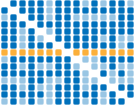Halotti beszéd és könyörgés (1192–1195 között) (Hungarian)
Egykori feltehető olvasat:
Látjátuk feleim szümtükhel,
mik vogymuk: isá, por ës homou
vogymuk. Mënyi milosztben
terömtevé elevé miü isëmüköt
Ádámot, ës adutta valá neki
paraadicsumot házoá. Ës mënd
paradicsumben valou gyimilcsëk-
tül mondá neki élnië. Hëon
tilutoá ut igy fá gyimilcsétul.
Gye mondoá neki, mérët nüm
ënëik: isa, ki napon ëmdöl
az gyimilcstul, halálnek
haláláal holsz. Hadlavá
holtát terömtevé Istentul, gye
feledevé. Engedé ürdüng intetüi-
nek, ës ëvék az tilvot
gyimilcstul. Ës az gyi-
milcsben halálu evék. Ës az gyi-
milcsnek úl keseröü vala
vizë, hugy turkolat migé szakasztja
valá. Nüm hëon mogánek, gye
mënd u fajánek halálut ëvék.
Haraguvék Isten, ës vetevé út
ez munkás világ belé: ës lëün
halálnek ës pukulnek fëszë,
ës mënd u nemének. Kik azok?
Miü vogymuk. Hugy ës tiü
látjátuk szümtükhel: isa, ës
nüm igy embër múlhatja ez
vermöt, isa mënd azhuz járou
vogymuk. Vimádjuk Uromk Isten
këgyilmét ez lélekért, hugy
jorgasson u neki, ës kegyigy-
gyën, ës bulcsássa mënd u
bunét! Ës vimádjok szen[t]
ahszin Máriát ë boudog Miháël
arhangyëlt ës mënd angyëlkot,
hugy vimádjanak érëttë! Ës
vimádjok szent Pétër urat,
kinek adot hatalm oudania ës
këtnië, hogy oudja mënd
u bunét! Ës vimádjok mënd
szentököt, hugy lëgyenek neki
segéd Uromk szinë eleüt, hugy
Isten iü vimádságok miá bul-
csássa u bunét! Ës szobodohha
ut ürdüng ildetüitul ës pukul
kínzatujátúl, ë vezessë ut pá-
radicsum nyugalma belí, ës adjon
neki münyi uruszág belé utat
ës mënd jouben részët! Ës
kíássátuk Uromkhuz hármúl:
kyrie eleison!
Szerelmes brátim! Vimádjomuk
ez szëgín embër lilkíért,
kit Úr ez napon ez hamus világ
timnücë belol menté, kinek ez
napon tëstét tömetjök; hogy
Úr ut këgyilméhel Ábraám,
Izsák, Jakob kebelében helhezjë;
hugy bírságnap jutván mënd u
szentëi ës ünüttei küzëkön
jou felol johtatnia íleszjë
ut! Ës tiü bennetük. Clamate
ter: kyrie eleison! | Publisher | Tankönyvkiadó, Budapest |
| Source of the quotation | Szöveggyűjtemény a régi magyar irodalom történetéhez. Középkor |
|
Funeral oration (cca. 1200) (English)
My brethren, you see with your own eyes what we are,
Surely we are but dust and ashes.
God in his divine grace first made Adam our ancestor,
And gave him Eden for his dwelling place.
He bade him live on all the fruits of Eden,
Forbidding the fruit of one tree only:
“If you eat of this fruit,
On that day shall you surely die the death of deaths.”
And Adam heard God, his Creator, speak of his death;
Yet he forgot. He yielded to the Devil’s tempting,
And ate of that forbidden fruit.
In that fruit, he partook of death.
So bitter was its juice, it burnt his throat.
He ate death, not only for himself,
But for all his children’s children.
In anger, God cast Adam out of Eden,
Into this world of toil and pain,
And he became the nest of death and damnation,
Himself and all his children’s children.
Who are those children? We are they,
As you can see with your own eyes.
None of us can escape that pit of doom,
That grave towards which we surely go.
Therefore we beg God’s grace
For this poor soul, his pity,
His mercy, and the forgiveness of sins.
We ask the Blessed Virgin and the Blessed Archangel Michael
And all the angels to pray for him.
We ask St Peter, to whom God gave the power
To bind and unbind,
To deliver this man from all his sins.
And we beg all the Saints to speak on his behalf
Before Our Lord, that, hearing their prayers,
He may forgive his sins,
Set him free from the Devil and the tortures of Hell,
Lead him back to Eden’s rest, show him the way to Heaven,
And let him share in Heaven’s blessings.
Let us cry out to the Lord three times:
Kyrie eleison!
Dearly beloved brethren,
Let us pray for the soul of this poor man,
Whom the Lord this day has freed
From the prison of this false world,
Whose body we bury today
That God in his grace may gather him
To the bosom of Abraham, Isaac and Jacob,
Among the chosen ones,
His saints who sit upon His right hand;
And that this man’s soul may ascend
When the Day of Judgment comes.
So be it for you all.
Clamate ter. Kyrie Eleison! | Publisher | Albion Editions, Manchester |
| Source of the quotation | Hundred Hungarian Poems |
|




